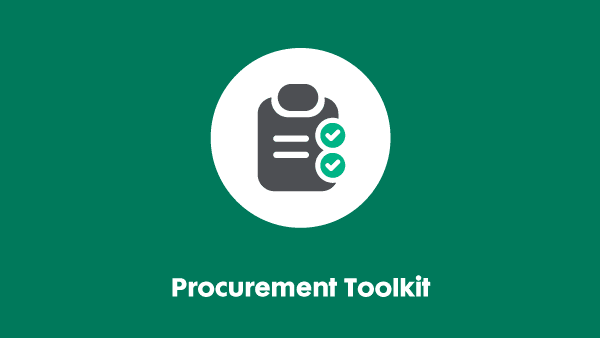Last modified: 9 July 2025
Why disability smart procurement matters
- Disability must be a priority in procurement, so that all users – including those with disabilities – can access and use what you procure.
- Ensure that products and services you procure address and meet the needs of all end users, including those with disabilities.
- Consult with disabled people with different disabilities.
- Consider ways in which a person’s disability might affect how they use or are affected by what you are procuring.
What is disability smart procurement?
Disability smart procurement means making sure that disability inclusion is a priority in procurement processes. It means consulting with disabled end users of procured goods and services, to make sure that you are procuring what they need and can use. It means creating policies and practices that don’t sacrifice disability inclusion for the sake of other goals.
It also means using your relationships with suppliers to improve standards in other organisations.
What is disability?
There are many ways of defining disability. In UK law, disability is defined by the Equality Act 2010 as:
“A physical or mental impairment that has a substantial and long-term adverse effect on a person’s ability to carry out normal day-to-day activities.”
For more information on what disability is, see our resource ‘What is disability?’.
How does procurement affect disability inclusion?
Procuring goods and services without considering the needs of disabled end users means potentially excluding many disabled people – employees, customers, clients and/or service users.
Inclusion starts at the beginning of the process – identifying and specifying what you need to procure. Consider what all end users need from the product or service – including disabled people. Include disabled people in the process, and specify explicitly how this should be done in the process.
It remains important throughout the procurement process, including:
- Creating tender specifications that specify how the product or service will be accessible and inclusive for disabled people.
- Awarding a contract to a supplier that you are confident will meet disabled people’s needs.
- Monitoring usability and inclusiveness during- and post-delivery.
- Working with suppliers to improve their own awareness and performance on disability inclusion.
Procurement teams should work with internal and external stakeholders – including disabled people – to create specifications.
See ‘Procurement policies and procedures’ for more information about how to prioritise disability inclusion throughout the procurement process.
The law on disability and procurement
In the UK and many other jurisdictions, organisations are legally responsible for ensuring that products and services they procure from external suppliers are accessible. Organisations can be legally liable for inaccessibility and discrimination relating to products and services they procure.
This means you could be open to legal challenges on the grounds of discrimination if something you have procured is not accessible or usable by a disabled person. This applies to all organisations, not just public sector organisations.
Scenarios
Scenario one – Inaccessible online systems
A company decides to cut down on its paper usage, and one step it takes is to replace paper pay slips with an online portal. This means employees can now only access their pay slips online.
However, the system they introduce is not tested for accessibility, and a few employees with sight loss find it difficult or impossible to read their pay slips on the new portal. One employee shows his latest pay slip to a co-worker and asks them to read it to them, to make sure there aren’t any errors.
A manager sees this interaction, and later calls in the employee for a meeting. The manager informs the employee that she must issue a formal warning, as company rules forbid employees from showing their pay slips to their coworkers.
The employee complains, saying this is unfair because he can’t use the new system the company procured.
Scenario two – Uniform design
A company is issuing new uniforms to customer-facing staff after a rebrand. They ask a design company to design and create new sets of uniforms for staff to wear.
When the uniforms are issued, some staff complain that the new uniforms are not breathable and make them uncomfortably hot and sweaty, to the point where they need to take more breaks to avoid overheating. In particular, some employees who are menopausal say that they cannot work in the new uniforms. It should be remembered that menopause can be considered a disability (see our factsheet on gynaecological conditions for more information).
They complain to their managers, saying they should have been consulted about the new uniforms. They would have said they need to be made of lightweight, breathable fabric.
Disability smart procurement – Top tips
- Procuring an inclusive product or service from the outset is better than trying to retrofit for accessibility.
- Before changing or upgrading an existing product or service, ask users with different disabilities:
- What barriers they currently face
- What accessibility features they value.
- Involve disabled users throughout the procurement process to get feedback on accessibility and usability at every stage – from design and development to review and testing.
- Ask potential suppliers and developers for examples of accessible and inclusive products or services they have developed for other organisations.
- Show your commitment to disability smart procurement with a message from a senior executive and share with colleagues.
Download a shareable PowerPoint presentation highlighting our top tips and further advice below.
Summary
- Disability must be a priority in procurement, so that all users – including those with disabilities – can access and use what you procure.
- Ensure that products and services you procure address and meet the needs of all end users, including those with disabilities.
- Consult with disabled people with different disabilities.
- Consider ways in which a person’s disability might affect how they use or are affected by what you are procuring.
Further information
The Global Business and Disability Network of the UN’s International Labor Organization (ILO) has created a guide for businesses on disability inclusive supply chains.
You can download it from the ILO website.
If you require this content in a different format, contact enquiries@businessdisabilityforum.org.uk.
© This resource and the information contained therein are subject to copyright and remain the property of the Business Disability Forum. They are for reference only and must not be copied or distributed without prior permission.

